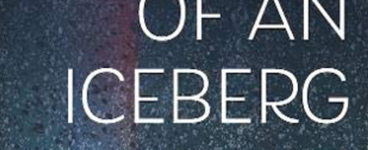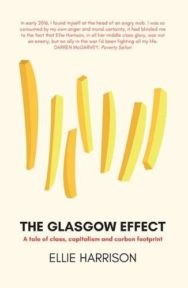‘It was alienation, anger and frustration that pushed me into creating The Glasgow Effect in the first place. It was a scream, which was then amplified by the city.’
In 2016, there was much debate over Ellie Harrison’s art project The Glasgow Effect. Now, with the project completed, Ellie has written a book about her experience of that year, her thoughts on why she started the project, and how she feels now about what she learned throughout the process.
Extracts taken from The Glasgow Effect: A Tale of Class, Capitalism and Carbon Footprint
By Ellie Harrison
Published by Luath Press
Anger and frustration were two of the overriding emotions provoked by The Glasgow Effect. People have every right to be angry in a world where the richest 1 per cent own two-thirds of global wealth and the richest 10 per cent cause half of global carbon emissions (which actually includes nearly all of us here in Scotland where we’re using three times our fair share of the world’s resources every year in order to fuel our carbon-intensive lifestyles), when all the while the ‘people who are poor and powerless bear the brunt’. People have every right to be angry at those in power who are doing nothing to remedy this situation – putting their own selfish interests above all else.
It was alienation, anger and frustration that pushed me into creating The Glasgow Effect in the first place. It was a scream, which was then amplified by the city. Enough is enough, we cannot go on like this! At the very start of 2016, the vitriolic response to The Glasgow Effect became a signal of the direction our world was heading towards.
. . .
This is where we come back to the arts. If art and cultural participation are also seen as ‘middle class things’, then that really is ‘robbery’ from the working classes, as these things can and should offer the antidote to consumer culture – a forum for free ideas and discussion away from the marketplace. It’s using your brain for something challenging like writing or reading, or making or viewing art, which enables you to start to see it as your most important asset, which makes it easier to turn away from drugs and alcohol and to protect it at all costs. ‘Your Health Is Your Wealth’ as Cathy McCormack so wisely said, mentally and physically. And as I discovered in 2015 after breaking both my arms, your health is also your ‘mobility’.
. . .
In the dark days of The Glasgow Effect, when I was cycling through the pissing rain and cursing out loud, or getting stuck in (self-)destructive Facebook wormholes, or waking up in the night with extreme anxiety and ‘home sickness’, I found it hard to remember any good things about this city. I forced myself to think hard. Back to the Scottish Government’s protection of the NHS in comparison to the Tories in England (which had come to my rescue on several occasions and no doubt will do again), to the fact that (unlike England) we still have publicly-owned water, to the free higher education, to the relatively cheap living costs (compared to London), but it was also the huge amount of free culture that I kept coming back to as the one reason why I had stayed here so long.
I kept meticulous records of every meeting, cultural, political or social event that I attended in 2016. There were 571 in total, most of which were free (funded with public money), meaning my annual bill for ‘entertainment’ came to only £129.50, about £2.50 a week. We must create a culture where all these brilliant events are seen as being there for everyone, they must be accessible and inclusive and inviting so anyone can go along. As well as that ingrained class prejudice, there’s a real structural barrier in the form of a shambolic and overpriced privatised public transport system, which means that for many people it’s simply impossible to get into the town, let alone home again, in the evenings. Not only have we created ‘food deserts’ through our failure to address our public transport crisis, we have wilfully created ‘cultural deserts’ as well. It’s no wonder our educational attainment is so poor. Both Carol Craig and Cathy McCormack argue that most poverty in Glasgow is ‘more psychological and spiritual than material’. And because ‘Inequality in arts participation is most closely associated with education’, another vicious circle has emerged.
All of these behaviours – eating unhealthy, expensive processed foods, smoking, drinking, other ‘mindless consumption’, not being able to cycle and rejecting art and cultural participation because ‘it’s no for the likes of us and it’s crap anyway’ – serve to entrench inequalities and reduce well-being amongst the most deprived people in the city. And this ‘aggressive philistinism’ is also potentially shutting people out of a fast-changing ‘labour market’ too, as the skills acquired through a creative education become those least at risk of ‘automation’ and are therefore the ones most in demand in our new ‘knowledge economy’. Likewise, Darren McGarvey and his followers’ resistance to applying for public arts funding for their work is also exacerbating inequalities. One of Loki’s many pieces about middle class people includes the line ‘they can’t be that creative, they’re all subsidised with public funding’. As well as his stated political reasons for not applying for public funding, it is clear his resistance is also about pride and the stigma of accepting any money from the state. It shows the extent to which the poisonous rhetoric of the right-wing media from the ’80s onwards (like the ‘NHS’ insult that I remember from the playground) has created deep shame in accepting welfare payments or other public funding. Neither of these things are a ‘begging bowl’ and if working class people just stand aside and let the city’s growing middle class population cream off all the public money, then they’re actually just helping to maintain the status quo.
The Glasgow Effect: A Tale of Class, Capitalism and Carbon Footprint by Ellie Harrison is published by Luath Press, priced £9.99
ALSO IN THIS ISSUE

 Mo Shearmon – The Way I Talk, A Poem taken from New Writing Scotland
Mo Shearmon – The Way I Talk, A Poem taken from New Writing Scotland
‘The way I talk moves, streams and urges, rushing along like water. . .’

 The Social Lives of Mongooses
The Social Lives of Mongooses
‘So for social mongooses there is enough food to go around for the whole group, and having another i …













